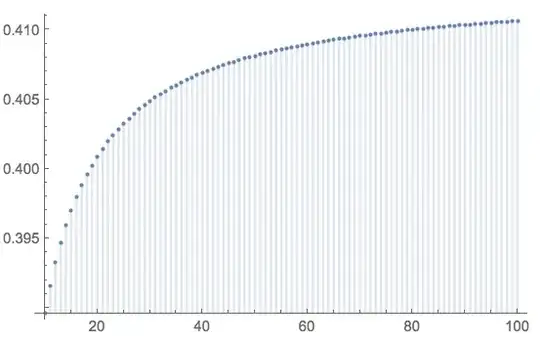$\newcommand{\bbx}[1]{\,\bbox[8px,border:1px groove navy]{\displaystyle{#1}}\,}
\newcommand{\braces}[1]{\left\lbrace\,{#1}\,\right\rbrace}
\newcommand{\bracks}[1]{\left\lbrack\,{#1}\,\right\rbrack}
\newcommand{\dd}{\mathrm{d}}
\newcommand{\ds}[1]{\displaystyle{#1}}
\newcommand{\expo}[1]{\,\mathrm{e}^{#1}\,}
\newcommand{\ic}{\mathrm{i}}
\newcommand{\mc}[1]{\mathcal{#1}}
\newcommand{\mrm}[1]{\mathrm{#1}}
\newcommand{\pars}[1]{\left(\,{#1}\,\right)}
\newcommand{\partiald}[3][]{\frac{\partial^{#1} #2}{\partial #3^{#1}}}
\newcommand{\root}[2][]{\,\sqrt[#1]{\,{#2}\,}\,}
\newcommand{\totald}[3][]{\frac{\mathrm{d}^{#1} #2}{\mathrm{d} #3^{#1}}}
\newcommand{\verts}[1]{\left\vert\,{#1}\,\right\vert}$
\begin{align}
\int_{0}^{1}H_{x}^{2}\,\dd x & =
\int_{0}^{1}\bracks{\Psi\pars{x + 1} + \gamma}^{\,2}\,\dd x =
\gamma^{2} + \int_{0}^{1}\Psi^{\,2}\pars{x + 1}\,\dd x
\\[5mm] & =
\gamma^{2} +
\lim_{q \to \infty}{1 \over q}\sum_{p = 1}^{q}\Psi^{\,2}\pars{{p \over q} + 1} =
\gamma^{2} +
\lim_{q \to \infty}{1 \over q}\sum_{p = 1}^{q - 1}
\bracks{\Psi\pars{p \over q} + {q \over p}}^{2}
\end{align}
$\ds{\Psi\pars{p \over q}}$ is evaluated with
Gauss Digamma Theorem:
\begin{align}
\Psi\pars{p \over q} & =
-\gamma - \ln\pars{q} - {1 \over 2}\,\pi\cot\pars{\pi p \over q} +
{1 \over 2}\sum_{k = 1}^{q - 1}\cos\pars{2\pi kp \over q}
\ln\pars{2 - 2\cos\pars{2\pi k \over q}}
\\[2mm] &
p \in \mathbb{N}_{\ \geq\ 1}\,,\ q \in \mathbb{N}_{\ \geq\ 2}\,,\quad p < q
\end{align}
A 'numerical approximation' $\ds{\,\mc{N}_{q}}$ is given by:
\begin{align}
\int_{0}^{1}H_{x}^{2}\,\dd x & \approx
\gamma^{2} +
{1 \over q}\sum_{p = 1}^{q - 1}\bracks{\Psi\pars{p \over q} + {q \over p}}^{2}
\equiv \,\mc{N}_{q}
\end{align}
The figure shows $\ds{\,\mc{N}_{q}\ \mbox{vs.}\ q}$.

